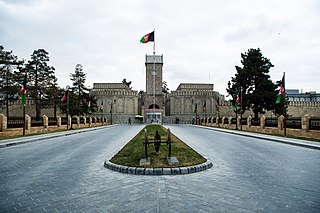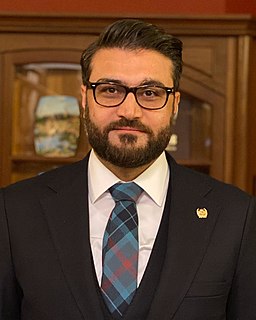The government of Afghanistan is currently disputed following the effective collapse of the Islamic Republic of Afghanistan during the fall of Kabul to Taliban forces on 15 August 2021 and the subsequent re-establishment of the Islamic Emirate of Afghanistan which now exercises de facto control over most of the country. On 7 September 2021 the Taliban officials in de facto control of most of Afghanistan announced a new interim government headed by Mullah Mohammad Hassan Akhund as Prime Minister. The government is subject to the oversight of the Taliban's Supreme Leader, Haibatullah Akhundzada. As of 8 September 2021, the Islamic Emirate of Afghanistan has not yet been formally recognized as the de jure government of Afghanistan by any other country. The representatives appointed by the Islamic Republic of Afghanistan continue to represent the country at the United Nations. These representatives have refused to recognize the Taliban appointed government and have urged other countries to not recognize this government either.

The president of the Islamic Republic of Afghanistan was constitutionally the head of state and head of government of the Islamic Republic of Afghanistan (2004–2021) and Commander-in-Chief of the Afghan Armed Forces.

Mohammad Ashraf Ghani Ahmadzai is an Afghan politician, academic, and economist who served as President of Afghanistan between September 2014 and August 2021.

Abdullah Abdullah is an Afghan politician who led the High Council for National Reconciliation (HCNR), which was expected to lead the intra-Afghan peace talks with the Taliban, from 2020 to 2021. He served as Chief Executive of Afghanistan from September 2014 to March 2020 and as Minister of Foreign Affairs from December 2001 to April 2005. Prior to that he was a senior member of the Northern Alliance, working as an adviser to Ahmad Shah Massoud. He worked as an ophthalmologist and medical doctor in the 1980s.

Abdul Ghani Baradar is an Afghan political and religious leader who is currently the acting first deputy prime minister of the Islamic Emirate of Afghanistan. He is also a co-founder of the Taliban. Although serving under supreme leader Hibatullah Akhundzada, Baradar is regarded as the de facto Taliban leader. He is known by the honorific Mullah, and Mohammed Omar, the first leader of the Taliban, nicknamed him 'Baradar', which means 'brother', or Mullah Brother.

The Arg serves as the presidential palace in Kabul, Afghanistan. It sits on a 34-hectare (83-acre) site in District 2, between Deh Afghanan and the affluent neighborhood of Wazir Akbar Khan. It has been used by many Afghan heads of state, from Emir Abdur Rahman Khan to former President Ashraf Ghani.

Presidential elections were held in Afghanistan on 5 April 2014, with a second round held on 14 June. Incumbent President Hamid Karzai was not eligible to run due to term limits. The registration period for presidential nominations was open from 16 September 2013 until 6 October 2013. A total of 27 candidates were confirmed to be running for office. However, on 22 October Afghanistan's Independent Election Commission disqualified 16 of the candidates, leaving only 11 in the race. By April 2014 three candidates gave up the race and decided to support some of the eight remaining candidates. Opinion polls showed Abdullah Abdullah and Ashraf Ghani as the front-runners and indeed the results of the first round of the election had Abdullah in the lead and Ghani behind him. The second set of results came after the run-off on 14 June, two months after the first round. Preliminary results were expected on 2 July and the final result on 22 July. However, widespread accusations of fraud delayed these results. As a result, John Kerry, then United States Secretary of State, mediated the negotiations between the two final candidates, Ghani and Abdullah. After a series of negotiations and talks between Ghani, Abdullah and Kerry, the two candidates agreed to sign an Agreement to form a National Unity Government based on 50–50 power sharing. As a result of that political agreement, a separate position was created for Abdullah as Chief Executive. The National Unity Government's term will run out after the next Afghan presidential election is held in September 2019.
The following lists events from 2014 in Afghanistan.

Hamdullah Mohib is an Afghan politician who served as the National Security Adviser of Afghanistan from 25 August 2018 till 15th August 2021. when he fled to Saudi Arabia. He served as the Afghan ambassador to the United States from 2015 until August 2018.

On 27 January 2018, an ambulance was used as a vehicle-borne improvised explosive device near Sidarat Square in Kabul, Afghanistan. At least 103 people were killed and 235 others wounded in the attack. The Taliban claimed responsibility for the attack.
The Afghan peace process comprises the proposals and negotiations that seek to end the war in Afghanistan that began in 2001. Although there had been sporadic efforts since the war began, negotiations and the peace movement intensified in 2018 amid talks between the Taliban, which is the main insurgent group fighting against the then-Afghan government and American troops, and the United States, thousands of whose soldiers maintained a presence within the country to support the Afghan government. Besides the United States, major powers such as China, India, Pakistan, Russia, as well as NATO, play a part that they see as facilitating the peace process, while the Afghan peace group People's Peace Movement sees regional and global powers as a cause of continued war.

Presidential elections were held in Afghanistan on 28 September 2019. According to preliminary results, which runner-up Abdullah Abdullah appealed against, incumbent Ashraf Ghani was re-elected with 923,592 votes, 50.64% of the vote. After delays over disputed votes, Ghani was declared the winner in the final results on 18 February 2020. Abdullah Abdullah rejected the results and moved to set up his own parallel government and separate inauguration. However, Ghani was officially sworn in for a second term on 9 March 2020. The ensuing political crisis was not resolved until 16 May 2020, when Ghani and Abdullah signed a power-sharing deal in which Ghani would remain president and Abdullah would lead the peace talks with the Taliban when they start. Voter turnout was less than 20%.

On 21 January 2019, in central Afghanistan, the Taliban attacked a military compound in Maidan Shar, killing officers of the Afghan National Directorate of Security. The Taliban attacked while engaging in the process of negotiating a truce with the United States. The attack began when an explosives-laden car rammed through a military checkpoint and onto the grounds of the compound, where the vehicle detonated. After the explosion, two gunmen entered the base and opened fire on Afghan soldiers, before the two were shot down. A senior official in the Afghan defense ministry said that 126 people were killed in the explosion. The Taliban claimed responsibility and stated that over 190 people were killed in the attack. The Afghan National Directorate of Security (NDS) reported that 36 military personnel were killed in the attack. Afghan president, Ashraf Ghani condemned the attack and said that the 'Afghan intelligence agency personnel were target of the attack'.

On 17 September 2019, two suicide bombings killed over 48 people in Charikar and Kabul, Afghanistan. The first attack occurred at a rally for president Ashraf Ghani which killed over 26 and wounded over 42. Ghani was unharmed in the incident. The second bombing occurred in Kabul near the US embassy. In this incident 22 were killed and another 38 were injured in the explosion. Children and women were among the dead and wounded in both attacks.
Events from the year 2020 in Afghanistan.
2021 (MMXXI) is the current year, and is a common year starting on Friday of the Gregorian calendar, the 2021st year of the Common Era (CE) and Anno Domini (AD) designations, the 21st year of the 3rd millennium, the 21st year of the 21st century, and the 2nd year of the 2020s decade.

The Doha Agreement, also known as the Agreement for Bringing Peace to Afghanistan, is a peace agreement that was signed by the United States and the Taliban on February 29, 2020, to bring the Afghanistan War to an end. The four-page agreement was signed at the Sheraton Grand Doha in Doha, Qatar, and published on the US State Department's website. It was negotiated by Zalmay Khalilzad.

A military offensive by the Taliban and allied militant groups against the Islamic Republic of Afghanistan and its allies began on 1 May 2021, coinciding with the withdrawal of United States and allied troops from Afghanistan. The offensive marked the end of the near 20 year old War in Afghanistan, that had begun following the United States invasion of the country in response to the September 11 attacks and resulted in the de facto takeover of the country and the reinstatement of the Islamic Emirate of Afghanistan.

Taliban forces took control of Afghanistan's capital city of Kabul on 15 August 2021 during a military offensive against the Afghan government that had begun in May 2021. The capture took place hours after President Ashraf Ghani fled the country. Most of the provincial capitals of Afghanistan had fallen in succession in the midst of a US troop withdrawal under a February 2020 US–Taliban agreement that concluded on 30 August 2021.

The Islamic Republic of Afghanistan was an Islamic republic that existed between 2004 and 2021 during the War in Afghanistan. It was established in 2004 after the 2001 United States invasion of Afghanistan captured most of the country from the Taliban-led Islamic Emirate of Afghanistan. It lost control of the majority of the country to the Islamic Emirate of Afghanistan in August 2021, culminating in the loss of Kabul on 15 August 2021.












